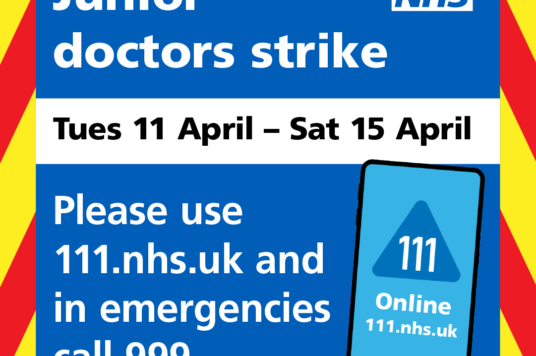Strikes and bank holiday double-whammy will have ‘huge impact’ on hospitals
Hospitals are preparing for a very challenging week ahead, with hundreds of junior doctors set to go on strike for the second time in a month.
A double-whammy of industrial action and the Easter bank holiday weekend is expected to ramp up pressures at St George’s, Epsom and St Helier hospitals.
During the strikes last month, 330 junior doctors walked out each day, on average, at these hospitals. It coincided with a surge in demand at the hospitals’ emergency departments, with more than 1,000 people – one every 90 seconds – coming through the doors on the first day, on what was the busiest Monday of the year.
Now, ahead of the fresh wave of strikes, members of the public are being urged to play their part by using NHS services wisely – ultimately ensuring that care continues to be available for those who need it most.
Members of the public are also advised that going to an emergency department when it’s not life-threatening doesn’t mean they will be seen more quickly and they may be redirected to a more appropriate service such as a pharmacy or GP. During the last junior doctors’ strike nearly 500 patients were directed away from our three emergency departments.
Dr Richard Jennings, Group Chief Medical Officer for St George’s, Epsom and St Helier University Hospitals and Health Group, said: “The strikes had a significant impact on our services last month and we expect it to be as challenging – if not more so – this time round, following the Easter weekend.
“We are always here for those who need care, and patients should still come forward in an emergency or if it’s life-threatening – as well as if they have an appointment. But for less urgent care, NHS 111 should be your first port of call, as they will be able to direct you to where you need to go.”
During the last junior doctors strikes, 3,000 inpatient and outpatient appointments at the hospitals were rescheduled, to ensure emergency and critical care could be prioritised.
But GP surgeries and pharmacies are largely unaffected by these strikes and can help with illnesses such as tonsillitis, coughs, colds and earaches.
Injuries like sprains and strains can be treated at home – or you can speak to a pharmacist about the best treatment.
If you take medication, remember to collect repeat prescriptions ahead of the Easter weekend. This is easy to do through the NHS app – and you can order what you need for collection.
Over the Easter weekend, many pharmacies will also be open – although their hours may be different. If you need urgent medical help or think you need to speak to a GP, you should use NHS 111 online first as this can direct you to where you need to go.
Dr Jennings added: “Last Easter bank holiday weekend was busy in our hospitals, and we saw an increase in people coming to our emergency departments as the weekend went on. This year we have a four day strike straight after Easter, so please help our staff to give help to those who need it most by using NHS 111 first.”
Notes to editors
Notes to editors:
- During the last strikes at St George’s, Epsom and St Helier University Hospitals and Health Group, 338 junior doctors were recorded as absent due to strike action on Monday 13 March, 347 on Tuesday 14 March, and 317 on Wednesday 15 March.
- For more information on industrial action, visit: england.nhs.uk/long-read/information-for-the-public-on-industrial-action/


